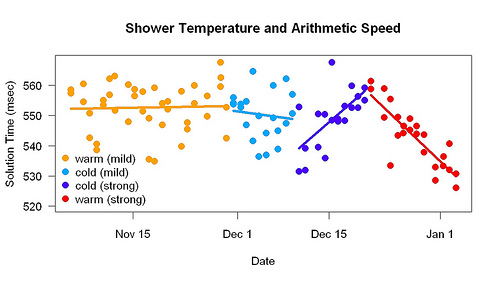In November I learned about benefits of cold showers. So I tried them. I took cold showers that lasted about 5 minutes. I liked the most obvious effect (less sensitivity to cold).
Maybe a bigger “dose” would produce a bigger effect. Maybe the mood improvement cold showers were said to cause would be clearer. So I increased the “dose” in two ways: (a) more water flow (I stopped holes in the shower head) and (b) lower water temperature. After a week or so with the stronger dose, I saw I was gaining weight. It could be the cold showers, I thought. Fat acts as insulation and I couldn’t think of another plausible explanation. So I went from cold showers back to warm showers (48 degrees C.) — this time with greater water flow. My warm showers were 5-10 minutes long.
I began to lose weight, suggesting that the cold water did cause weight gain. More surprising was that my arithmetic speed (time to do simple arithmetic, such as 7-3, 8*4) began to decrease. Here is a graph of the results.

Before the cold showers started my arithmetic speed was roughly constant. The mild cold showers had no clear effect. I had noticed the increase during the strong cold shower phase but hadn’t paid it much attention — I suppose because it seemed implausible. These results, however, are excellent evidence for cause and effect: cold showers made me slower, warm showers made me faster. The arithmetic tests weren’t done soon after the shower. There seems to be some sort of brain-speed adjustment that takes place over ten days or more.
I’ve never heard of anything like this, whereas I’ve heard many times is that cold showers are good. There is one complication, which is that December 3rd I stopped eating walnuts. I believe walnuts are bad for the brain, in contrast to the usual belief. I came to believe that because of results from two students of mine who had tried eating them. Improvement due to no longer eating walnuts would explain why line fitted to the strong cold data starts below where the weak cold line ends. The final days of the strong warm phase may be the same as the weak warm phase when adjusted for the walnut difference.
What explains this? Maybe the weight change. When gaining weight, maybe fat was taken from the blood to be deposited in fat cells, thus lowering the fat content of the blood reaching the brain and thus degrading brain performance. Losing weight, the opposite happens. Eventually the weight loss will stop; this explanation predicts when that happens the warm-water effect will go away.
In a previous post I wondered why I had gotten faster at arithmetic over the previous six months. These data suggest that warm showers may be at least part of the reason. In Berkeley I take baths, not showers.